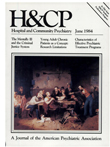Continuing Education as a Link Between Urban and Rural Mental Health Professionals
Abstract
The courses within the core curriculum program have achieved their primary objective of extending the educational resources of an urban university to a network of rural mental health agencies. Additional benefits have been derived from the program. The university faculty has gained a greaten appreciation of the relevance of rural issues and problems to the delivery of mental health services. Linkages between the urban university and the rural agencies have been strengthened.
Former core curriculum participants now constitute a group of colleagues who can stimulate new forms of collaboration and serve as leaders in future training programs. The program has also led to increased awareness and sensitivity on the part of university mental health professionals to the needs of rural clients who obtain services in the urban system. Currently, OERP is implementing a plan to improve communication between the university's inpatient psychiatric units and the mental health facilities in the rural communities. The core curriculum program will continue to play a major role in the ongoing development of this collaborative process.
Access content
To read the fulltext, please use one of the options below to sign in or purchase access.- Personal login
- Institutional Login
- Sign in via OpenAthens
- Register for access
-
Please login/register if you wish to pair your device and check access availability.
Not a subscriber?
PsychiatryOnline subscription options offer access to the DSM-5 library, books, journals, CME, and patient resources. This all-in-one virtual library provides psychiatrists and mental health professionals with key resources for diagnosis, treatment, research, and professional development.
Need more help? PsychiatryOnline Customer Service may be reached by emailing [email protected] or by calling 800-368-5777 (in the U.S.) or 703-907-7322 (outside the U.S.).



